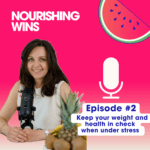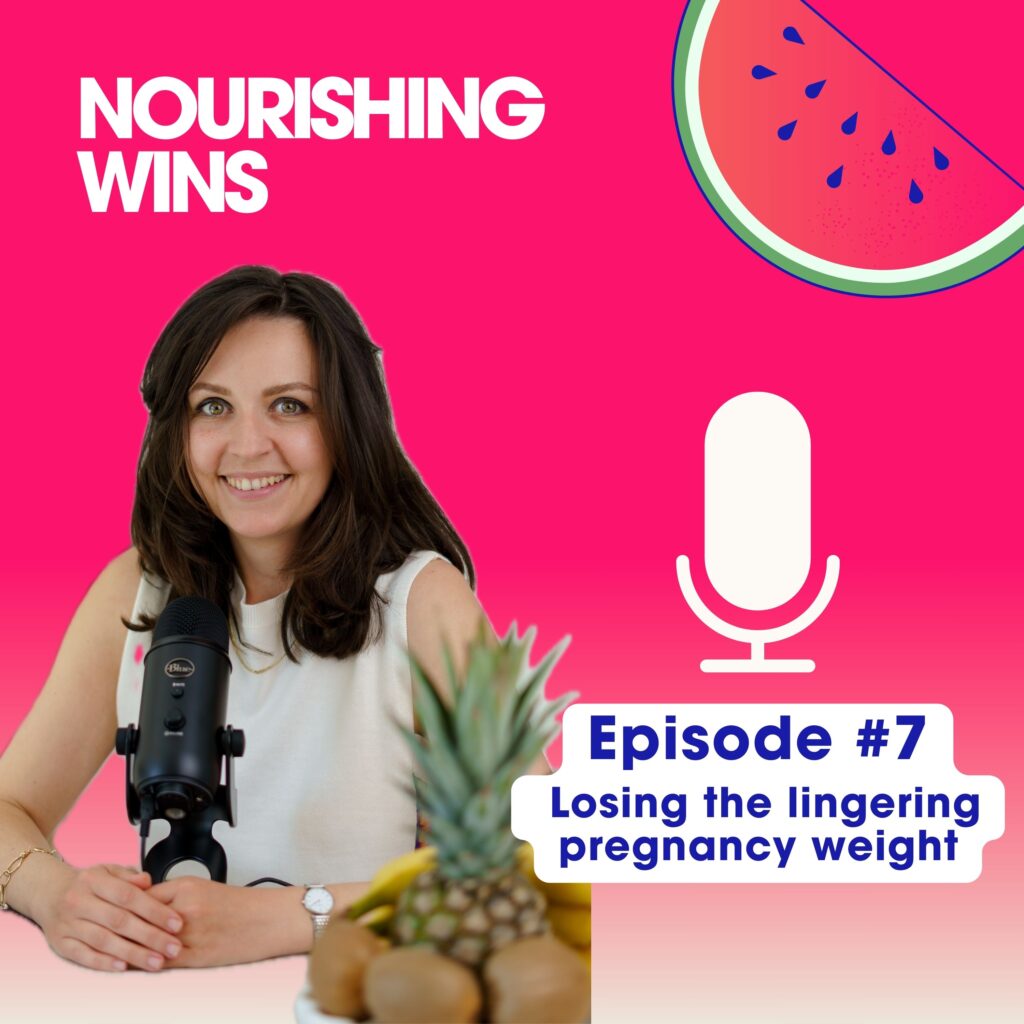
Listen on your Podcasting App
Show Notes
In this episode, I talk about stress and the implications of constantly being in the fight-or-flight state on our body and weight gain.
I will also offer some practical ways in terms of nutrition and mindset so that you preserve your health as much as possible and avoid putting on excess weight.
You will learn:
- that exteriorizing stress and anger helps release stress and remove cortisol from the body
- that asking for help and setting boundaries can go a long way in reducing the stress in your life
- how stress impacts digestion
- how excess cortisol determines you store more fat around your waist
- exactly what foods can help support your nervous and endocrine systems which can be overworked if you are under chronic stress.
📺 Follow me on Instagram @cristina.nutrityv
💌 Join my free weekly newsletter
Follow on LinkedInTranscript
Welcome to Episode number two of Nourishing Wins: “Keep your weight and health in check when under stress”
In this episode, I want to talk about stress as it is something that most of us, active women, deal with which has a huge impact on our health and weight gain. I will dive deep into the implications of constantly being in the fight-or-flight state and offer some practical ways in terms of nutrition and mindset so that you preserve your health as much as possible and avoid putting on excess weight.
Work pressure, inflation, the major layoffs that happened in a lot of corporations and smaller companies alike, the increase in interest rates, and the overall geopolitical situation – there are a lot of reasons to be under stress nowadays.
Add to these childcare responsibilities and the infinite list of household chores and you might end up in a state of permanent stress.
According to a six-country European survey, 38% of workers are at high risk of poor mental health.
An analysis by healthcare company Maven found that mothers in paid employment are 23% more likely to experience burnout than fathers in paid employment. Women also tend to experience more stress on account of being overlooked for promotions and pay (reizis) rises and being paid less than men for similar positions. The European Commission states that women in the European Union continue to earn less than men with the average gender pay gap in the EU standing at 13%. This means that for every €1 a man earns, a woman will make only €0.87.
When work hours – both at your job and at home – are long, you might not pay attention to what you eat. You might just have something to fill your stomach to get you through the day … in terms of not being hungry. Thoughts of getting the necessary nutrients to support your brain and your adrenal glands are far away.
The adrenal glands are part of the endocrine system and are located on top of your kidneys. They produce hormones and play an important role in the stress response and in regulating the metabolism. They produce adrenaline, noradrenaline and cortisol – the stress hormones that prep your body to face the stressor.
These hormones stimulate the heart, increase blood pressure and heart rate, constrict certain blood vessels to increase blood flow to the muscles and brain and decrease it to the digestive tract and internal organs, preparing us for the battle with the danger. Adrenaline raises blood sugar by stimulating the liver to produce and release more glucose into the blood.
All these physiological responses to stress are normal and useful.
But when excess cortisol is not removed from the body, when the stressor is always present, or, more accurately, your reaction to a PERCEIVED stressor is always on, you put yourself at risk for many health problems and abdominal weight gain.
Excess cortisol is linked to fat being distributed around your waist. So, if you notice you gain weight especially in this area as opposed to your hips or other parts of your body, consider your level of stress and how you react to it.
Excess cortisol reduces its counterpart hormone: testosterone in both men and women, leading to a loss of sex drive and muscle mass and an increase in fatigue and body fat.
We are all exposed to stress but we don’t respond in the same way. Some of us have a more pronounced reaction and we produce more cortisol.
A study of 41 overweight women found that -> those with a higher waist-to-hip ratio demonstrated a more helpless reaction to stress than those with a lower ratio. They manifested less anger and anger expression is associated with reduced levels of cortisol. The study concluded that cortisol secretion can therefore be THE mechanism through which stress causes fat to be distributed around the waist.
Another study from Yale looked at pre-menopausal, non-overweight women and their reaction to stress. It found that those who are MORE vulnerable to stress, have more abdominal fat. Those that had more fat around their belly also reported more frequent negative moods.
Stress is rarely in the situations themselves. It comes from the way we react to them. For stress to arise and negatively impact our health, we must experience something as a threat, a danger to our survival.
This isn’t to put blame on you for experiencing stress. It is for helping you realize that you DO have control over it.
If you adopt the position of the victim, you give up control. Of course, I am NOT talking about situations where there is a victim and an aggressor. I am talking about life circumstances when we surrender control to others or external events. If you want to be part of the solution, you cannot think of yourself as the victim.
And part of the solution can be simply asking for help if you can’t seem to find a way out of a stressful life.
Ask for help with your to-do list or what you perceive as your responsibilities. Reflect on your capacity to say “No” and your tendency to please others. Do you spend maybe too much time on activities that you don’t really want to do but you couldn’t say No to? Time that can be better used for relaxation and sleep. Are you afraid of being less liked if you decline some of the plans that people include you in?
It is helpful to talk to your partner and other close family members about how they could help you and share the work that needs to be done.
Another effective way to reduce stress is expressing feelings. As I said just before, anger expression is associated with reduced cortisol. Find outlets for frustration and stress.
Talk to a friend, a therapist, a coach or write in a journal. It will help you see the bigger picture and step out of the little struggles.
Exercising, running, cardio or dance classes also release stress. Doing yoga, of course, is well known in this area.
Establish boundaries in terms of what is reasonable to be asked from you at work and be ready to accept the consequences, even if they might not be fair. Prioritizing your mental health or family can be seen as “not giving your best” in some work settings.
Remember, when you are exhausted and stressed, it is difficult to think creatively, see things differently and find solutions. It doesn’t mean they don’t exist.
Let’s talk now about nutrition and how to keep your weight under control, eat to support your adrenals and avoid digestive issues when you seem to be constantly under stress.
Stress experienced around the time of eating, diverts the energy needed for efficient digestion. This is why it is important to avoid it around meals. For example, you can listen to relaxing music a few minutes before and after eating. Place yourself in a receptive place for the food coming in.
Eat 3 to 5 light, nutrient-rich, wholesome meals. Stress depletes a lot of nutrients from the body, so you need to consume nutrient-dense foods.
What does it mean for a food to be nutrient-dense? It means that it has not been TOO processed because processing always takes away nutrients. For example, having whole rice is better than having rice-flour noodles.
It also means that the meal has plenty of complex carbohydrates, proteins, healthy fats, vitamins, minerals and polyphenols. Not only refined carbohydrates that get digested and absorbed quickly, which is what most convenient foods that you can buy and eat when you are in a rush, are made of. They don’t actually feed you and they certainly don’t support your nervous and endocrine system to face stress. Sandwiches that are mostly white bread, pastries, burgers, breaded meats with potatoes or white rice and no other vegetables – are not nutrient-dense foods.
Choose high quality protein sources like lean meats from grass-fed, and, ideally, organically fed animals, fish, eggs, tofu, nuts, and legumes. Combine them with leafy greens, colorful vegetables and whole grains. Finally, add some healthy fats like olive oil, flaxseed oil and avocado.
Magnesium and B vitamins are generally depleted in chronically stressed individuals and you can find them in leafy greens. Leafy greens with significant amounts of magnesium include kale and spinach. Dark chocolate is also a good source of it.
Recipes that can easily contain a diversity of vegetables and allow for ingredients to be easily substituted are curries and oven-roasted veggies. You can even have these the next day in a Buddha bowl for lunch.
A Buddha bowl is a typically vegetarian meal, which consists of small portions of foods, served cold. You may include whole grains such as quinoa or brown rice, plant proteins such as chickpeas or tofu, and vegetables: raw, cooked or fermented. You can find a variety of recipes online and once you get a hold of the principles, you will be able to create your own quite quickly.
Also, juices, soups and salads can nourish well, without creating great demands on the body and digestion. Productivity and energy levels may rise with lighter eating and simpler meals.
Although you might think that choosing wisely your food is not a priority when you are under stress, it is, on the contrary, essential in order to avoid damaging your health and deregulating your metabolism. Weight gain is an unfortunate byproduct of prolonged stress and learning how to cope with it is an important part of a weight loss plan. Excess weight is a sign of imbalance and when your body and mind get what they need, you will return to a healthy body shape and size.


